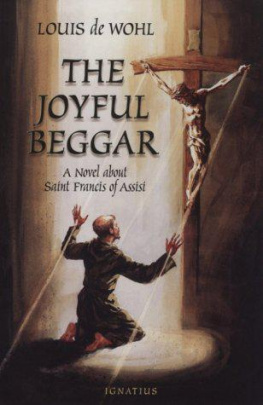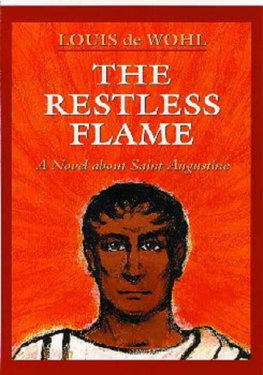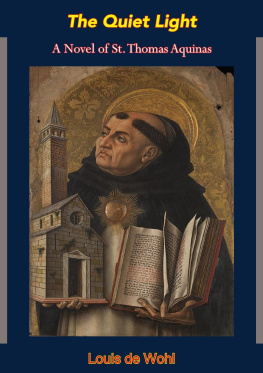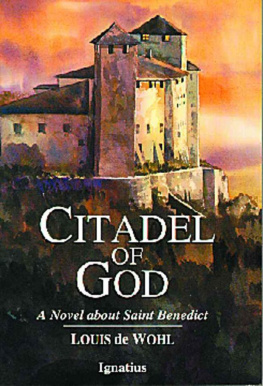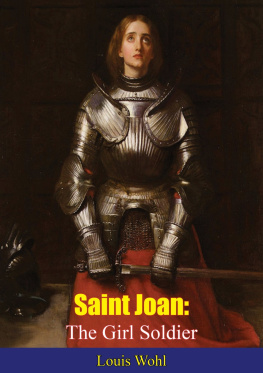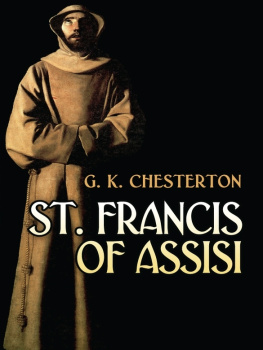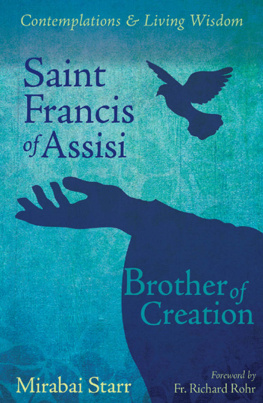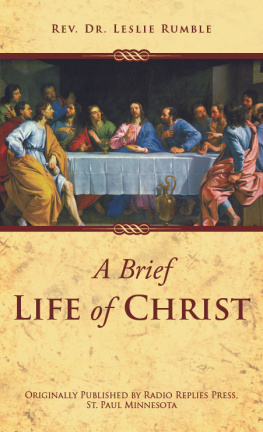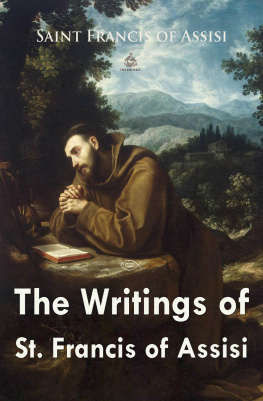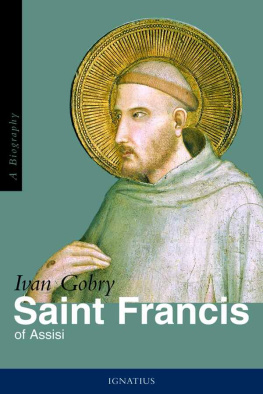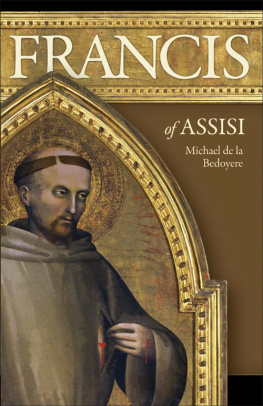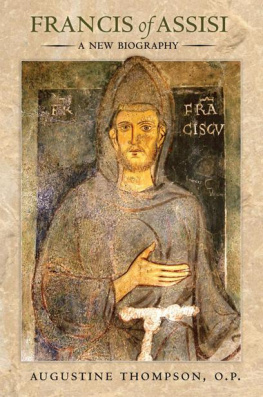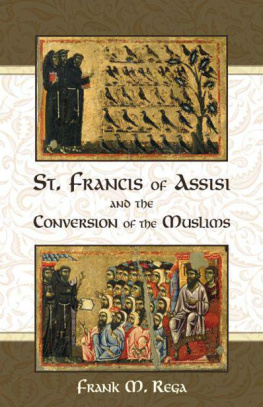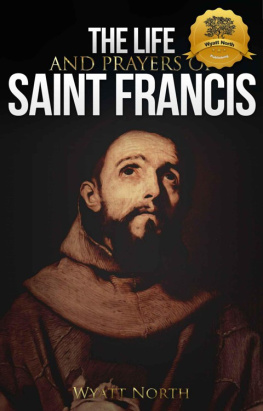CHAPTER I
A.D. 1202
"I NEED MONEY", said the pale young man, elegantly crossing his long legs.
Bernard of Quintavalle nodded noncommittally and started smoothing the folds of his dark green coat, a habitual movement of his when appraising a customer.
The customer could scarcely be more than twenty years of age. His dress was not exactly luxurious: second-grade wool dyed blue, with little and rather artless embroidery, a leather belt with a simple silver clasp. The shoesalways look at a man's shoeswere well made but also well worn and had no buckles. Still, it was the dress of a young knight, and young knights were known to be on the lighthearted side. This could be the son of some minor noble, who had lost his money and accouterments gambling or jousting with opponents too good for his lance, and who was too far away from his father's little castle to get more.
Yet it was difficult to believe that this young man was light- hearted, despite his somewhat direct approach to the reason for his visit. He had a very serious young face, lean, with brilliant gray eyes and a proud nose; he had a firm mouth, with thin lips.
He looked foreign, and Bernard, as a much-traveled merchant, was just a trifle irritated by not being able to decide where he came from. He certainly was not from the North of Italy. His Italian had an accent that was neither German nor French, though it was closer to French than to German.
"Forgive me, Sir Knight," Bernard said, "but I didn't catch your name when my servant announced you. Also my poor Filippo is not too good at pronouncing foreign names ..."
"I am Roger de Vandria", the young man said. He seemed to expect that no further explanation was necessary.
"I am much honored", Bernard said courteously. "May I ask why you come to me rather than a banking house?"
Roger de Vandria's smile destroyed some of the good impression he had made; it was bitter and mocking, the veil before the face of defeat.
"My father used to say that banking houses are like women, Messer Bernard. They welcome only those who have already shown themselves to be successful, not those who only expect to be."
"There is something in that", Bernard of Quintavalle admitted cautiously. "But ..."
"They are always willing to lend money to those who don't need it, and never to those who do", the young man went on. His bitter smile deepened. "I have seen the Fres- cardi in Bologna and the Pisani in Perugia. I've had my fill of banking houses. And I don't want to go to common usurers. When I came here to Assisi I made inquiries. You were pointed out to me as a man of wealth not averse to business affairs. So here I am."
"Good Christians", Bernard said gravely, "are not supposed to lend money on interest ..."
"Oh, I know, I know", the young noble said ironically. "Neither are they supposed to kill or to commit adultery. But they do sometimes, I'm told."
Bernard shook his head. "I have made a number of business arrangements since I retired from selling imported goods," he said, "but always on the basis of a sale."
"I've heard that, too." Roger de Vandria gave a shrug. "You buy; later on the seller can buy his property back. For a higher price, naturally. That way you do not take interest, you break no commandment of the Church, you are an exemplary Christianand yet you increase your wealth. An admirable custom, Messer Bernard."
Quintavalle frowned. "It is a generally accepted practice..."
"Of course. And it happens to suit me, too. I offer you my castle for saleon the condition that I may buy it back within, let's say, two years."
" Your castle?" Bernard gave the young man a startled look.
Roger drew himself up a little. "I couldn't very well sell you what does not belong to me, could I?"
"And where is it?" Bernard asked somewhat dubiously.
"In Sicily. Two days' ride from Monreale. I have all the documents with me."
"In Sicily!" Bernard of Quintavalle began to laugh. "My dear young... my dear Sir Knight, Sicily!"
Roger's eyes narrowed. "What, if I may ask, causes you such hilarity at the mention of the most beautiful island on earth?"
Bernard dabbed at his eyes. "Sicily," he repeated, "and on the island itself, moreover.... My dear Sir Knight, you told me that banking houses are like women. Well, so are countries. The more beautiful and rich they are, the more suitors will try to win them. You're right, Sir Knight, Sicily is a very beautiful island. No wonder she has so manysuitors."
"Sicily belongs to Sicily", the young noble said fiercely.
"No doubt, no doubt. But it'll be hard to convince the emperor that this is sothe emperors, I should have said, now that Philip of Swabia and Otto of Brunswick both claim that title. Besides, there are some very powerful German
nobles down there whose allegipnce to either of the two emperors does not seem to be quite clearly defined. There is a king of Sicily, too, unless I'm mistaken, little Frederick, aged six or seven ..." "Eight."
"Eight, then. There are tribes of Saracens, all of them armed to the teeth and ready to claim anything and everything. And there is the Holy Father in Rome, who will have his say too. Sicily! I wager there is no one in the whole world who could say who is going to rule Sicily six months from now."
"True," the young man admitted coldly, "but that makes no difference. My castle is my castle. I inherited it from my father when he died, a year ago, in Mainz."
"Mainz? That's in Germany, surely."
"It is."
Suddenly Bernard understood. "Who is holding the your castle at the present time, Sir Knight?" he asked softly.
Roger bit his hp. "I wish I knew", he said. "But whoever it is, I shall get him out."
Bernard nodded. "You were living in exileyou and your later father? I thought as much. And what you are looking for is someone who will finance your fight to get the castle back, isn't that it? My dear Sir Knight, I am not rich enough for that kind of thing. And I scarcely blame the Frescardi and the Pisani for not giving you their support."
Again the bitter smile. "I am not such a fool, Messer Bernard. I know that no one would lend me a sum sufficient for an armed expedition. My hopes are far more modest. All I want is to get to Vandria myself. But traveling costs money, and I spent my last Florentine guilder yesterday afternoon."
"But then you must be hungry!" Bernard threw up his hands. "Of course you are. Where have my eyes been? Ah, well, there at least I can render some assistance. Filippo! Filippo!"
The servant appeared in the door.
"Bring some food at once, Filippo, bread, meat, cheese, anything that's ready. And some wine. Don't you hear me? What's the matter with you?"
There was no need for Filippo to answer. Behind him loomed a large, bulky man, bearded, beetle browed, paunchy.
"Messer Cuomo", Bernard exclaimed as he rose to his feet. "What gives me the honor of your visit? Filippo, a chair for Messer Cuomo. And then go and get food as I told you. Sir Knight, Messer Cuomo is the newly elected chief constable of our town ..."
"And here in his official capacity", Cuomo interposed, with a little bow. "Forgive me, therefore, Messer Bernard, if I do not sit down. May I ask how well you are acquainted with this... noble visitor of yours?"
"1 was about to make the introduction", Bernard replied with a hint of reproach. "This is Count Roger of Vandria. He hails from Sicily."
"Perhaps", Cuomo said, coldly offensive.
Roger's hand flew to his sword hilt.
"Please, do not excite yourself", the chief constable told him. "Four of my men are waiting outside. Messer Bernard, I must repeat my question: How well are you acquainted with this man?"

